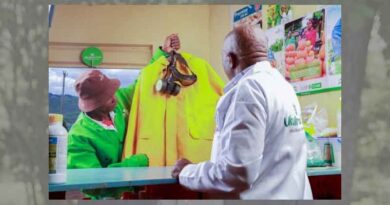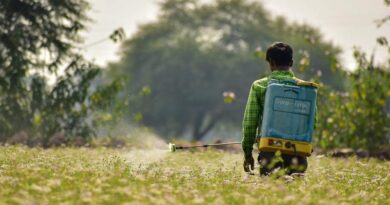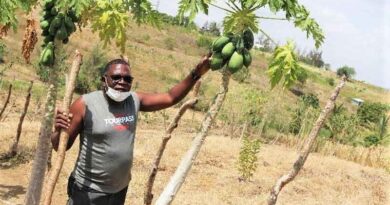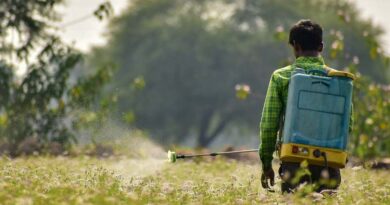Initiative launched to help reduce risk of pesticides to farmers, consumers and the environment in Nakuru County, Kenya
11 July 2023, Kenya: CABI, CBCC (Centre For Behaviour Change and Communication) and the Department of Agriculture, Nakuru County, Kenya have launched a new initiative called “Ukulima True” to help reduce the risks to farmers, consumers and the environment from chemical pesticides.
The initiative – which is the first step in the implementation of a County Social Behaviour Change Strategy on Pesticide Risk Reduction validated in April, 2023 – will help smallholder farmers increase their yields, profits and ensure greater local and national food security.
It will also specifically raise awareness to promote more safer-to-use and sustainable biological pesticides (biopesticides) as well as the need to monitor and scout to identify and manage crop-devastating pests and diseases early – such as the fall armyworm (Spodoptera frugiperda) – as part of an Integrated Pest Management plan.
Meaning ‘true farmer’ in Swahili, Ukulima True is encouraging everyone involved in the food value chain to support farmers to use pesticides more safely including ensuring that their sprayer is calibrated to dispense the correct amount of product and wearing personal protective clothing.
As part of the launch event for the Ukulima True campaign, representatives from CABI, CBCC and the Department of Agriculture, agro-input suppliers, farmers, and market traders gathered to also learn about a range of digital tools from CABI which can help make the use of pesticides even safer.
This included a demonstration of CABI’s Crop Sprayer App – which helps ensure the correct dosage of pesticide is applied, thereby mitigating against under or over spraying and the cost impact of wasting product – as well as the CABI BioProtection Portal. The portal is the largest global database of biological plant protection products which helps users identify the best product to tackle a particular pest on a specific crop.
The launch of the Ukulima True campaign also comes following CABI-led research, published in the journal CABI Agriculture and Bioscience, that, for example, revealed a willingness of smallholder papaya farmers in Kenya to reduce their chemical pesticide use to fight the papaya mealybug (Paracoccus marginatus).
The study, led by Kate Constantine, Project Scientist at CABI, found that in a desperate attempt to control invasive alien pests’ farmers often resort to the use of broad-spectrum insecticides. This is despite biological control being a more sustainable method of pest management that is extremely suitable in the smallholder production context found in Sub-Saharan Africa (SSA).
Geoffrey Rugaita, Social Behaviour Change Communications Lead, based at CABI’s regional centre for Africa in Nairobi, said, “The need to produce safe, quality and profitable crops more sustainably has never been greater in the face of the challenges posed by climate change and pandemics such as COVID-19.”
“This campaign will draw upon the aims of the County Social and Behaviour Change Strategy on Pesticide Risk Reduction and, in partnership, will raise the profile of safer pesticide use by disseminating key messages through interpersonal communication, print, radio and video media.”
Around 70% of Nakuru County land is ripe for agricultural production. In 2016, for example, the county generated over Kshs 2.91 billion from 180,388 tons of maize. However, production is constrained by bottlenecks along the value chains including pests and diseases.
Hannah Oduor, from the Department of Agriculture, Nakuru County, said recognising the risks of pesticides in managing crop pests and diseases requires collaboration and action at many different levels.
“Ukulima True will take a holistic approach to reducing the risks of pesticides – to both humans and the environment – by raising awareness and giving training to farmers themselves as well as extension workers, market traders and agro-input suppliers,” she said.
She added that the smallholder farming community and other stakeholders were key in the formation of the County Social and Behaviour Change Strategy on Pesticide Risk Reduction and will be equally important in the implementation of that as well as the Ukulima True campaign.
The Constantine et al. paper also highlighted that their research demonstrates significant differences in farmer perceptions between counties and gender which are helpful in focussing resources going forward.
For instance, more men perceived biological control to be useful and necessary than women, suggesting a need to increase women’s awareness and understanding of biological control.
Part of Ukulima True’s remit will, accordingly, be to ensure that women smallholder farmers are also targeted with key messages from the media including a range of campaign materials and training.
Also Read: Syngenta India to train and certify 1000 spray men
(For Latest Agriculture News & Updates, follow Krishak Jagat on Google News)















